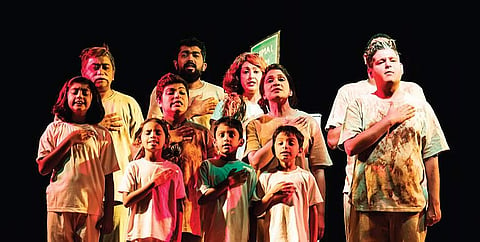

Nothing frees the mind like art. What better way to express oneself without fear or restraint. A few months ago, the Centre for Film and Drama collaborated with Snehadhara Foudnation to present George Orwell’s Animal Farm. It was performed by a group of children from Bengaluru, including five differently-abled children. Originally based on the historical events of the Russian Revolution of 1917 and its aftermath, Animal Farm is a reflection upon contemporary realities. We talk to Nilanjan Choudhury, the director, on what it was like working with differently-abled children and how theatre benefits them.
How many children are a part of the crew?
When the play initially opened in Bengaluru in October 2015, there were eight children including five differently-abled children from Snehadhara Foundation. This was the cast that continued through ten subsequent performances at various venues in Bengaluru. However, it was very difficult, practically and monetarily, for so many children (especially the differently-abled ones, who had to travel with their caregivers) to do outstation shows. So, for the Chennai shows, we pared the cast down to four children. The children study at Inventure Academy and are in the age group of 7 to 10 years.
How difficult was it for the children to do back-to-back shows?
This is the first time that these children are doing four back-to-back, public, ticketed performances which generates pressure and expectations that can be challenging for young minds to handle. However, these children have displayed tremendous amounts of perseverance and tenacity. There has been steady growth and resilience exhibited during the recent shows, beautifully handling the demand. Leaving home as early as 6:30 am and returning at midnight, and repeating this with a smile and no fuss, not many adults could do this.
How did the whole experience help these children understand equality?
Each child is unique. By doing inclusive theatre, we didn’t want to limit the children to just being token cast members. It meant going the whole hog — they, along with the rest of the cast, were put through the same process of discipline and rigorous rehearsals. In Animal Farm, all the actors were considered equal. Though initially stressful, things improved and the team started seeing a few surprises, which gave them joy and hope.
What was most challenging about dealing with differently-abled children?
The main challenge was actually working with an 18-member cast and crew, and getting them all together. There were problems in communication. A lot of the children do have issues like a short attention span, issues dealing with bright lights and loud sounds, and stage fright, but we have worked around these challenges and in a small way, helped them overcome them as well.
How do you think theatre helps children with disabilities, as a parent?
The biggest thing learnt from this play is that we should treat them like anyone else. We shouldn’t make assumptions about people we don’t know. They are full of surprises. Seeing the children being supportive, helpful and feeding off each other during this long and demanding journey of rehearsals in an uplifting spirit of friendship, loyalty, and fun has left us with lessons to create and encourage equal spaces in theatre and outside.